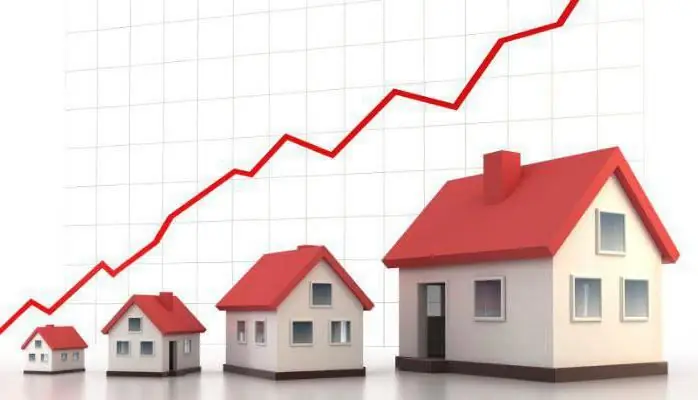2026 Author: Howard Calhoun | calhoun@techconfronts.com. Last modified: 2025-01-24 13:10:26
In the world practice in the field of real estate appraisal, three approaches are used:
- comparative, or market;
- costly;
- profitable.
The choice of methodology largely depends on the object of assessment and the real situation that has developed around a particular type of real estate. However, the comparative approach in determining the estimated value is still considered the most reliable way.

Basic Benchmarking Principles
The comparative approach is a set of methods for determining the market value of a property. The appraised property is compared with similar properties.
Evaluation is based on the following principles:
- Demand and supply. These two indicators are inseparably linked, a limited number of offers generates a certain demand, and vice versa, the more offers, the less demand.
- Replacement. No buyer will pay more if a property with similar characteristics costs less.
The concept of market value is almost identical to the concept of equilibrium price. The equilibrium price is a set of quantitative characteristics andpricing factors that determine supply and demand for the item being compared.
Main criteria for selecting comparable properties for real estate valuation
There are a huge number of elements that are taken into account in a comparative analysis, and their combination is almost infinite. Therefore, the analysis is limited to a certain number of factors that directly affect pricing.

Comparison elements. Rights quality
Any encumbrance or easement leads to a decrease in the value of the property being valued. That is, any restriction in the right of ownership is a reduction in price. If the object being valued does not have such shortcomings in comparison with comparable objects, then the price, on the contrary, increases.
For land plots, the availability of easements is not the only reducing factor. When assessing the value is very important, transfers the ownership of the land or the right to lease, permanent use. The last two rights are referred to as reducing factors. It is very important whether the land has certain restrictions on further transactions with it.
Terms of sale
Such conditions are taken into account if the appraised object really has distinctive features when sold.
Bankruptcy is a reducing factor, that is, the seller is in a hurry to make a purchase and sale transaction, since the exposure time of the real estate market object is obviously reduced compared to similar objects.
The assessment is also significantly influenced by family ties, partnershipsrelationship, although it is difficult to assess these risks.
If the seller and the buyer are connected by lease relations, and it is planned to conclude a contract of sale between them, then in order to save on tax payments, of course, the estimated cost will be underestimated. In this case, there is only one motivation - since the parties to the transaction are connected by other non-market relations, therefore, the seller actually credits the buyer. A similar situation develops if the transaction is on the terms of the option.
The prospect of receiving state subsidies for infrastructure development may lead to an increase in the estimated value of residential real estate. The amount of expected concessional lending is determined from the difference between concessional and market lending.
Market Conditions
A downward adjustment may be applied if there is a significant difference between the market value for a similar property and the expert property.
A change in functionality can also be taken into account in the assessment, as it affects the balance of supply and demand.
Property location
| Value drivers | Cost-Depressing Factors |
|
Neighborhood Prestige Status of other residential property owners Reserve area Parking availability Accessibility to highways Presence of architectural monuments and other attractions Recreational area near real estate Unique architectural features of the building |
Distance from the city center No grocery stores within walking distance Remoteness from school and preschool institutions Bad environmental situation in the region Presence of factory and warehouse enterprises near the property, landfills |
Physical factors (for land)
Comparative approach in the evaluation of a land plot involves the collection of characteristics about the property:
- size;
- shape;
- geology;
- topography;
- level of preparedness, that is, whether the land has been cleared of vegetation, whether irregularities have been eliminated;
- qualitative indicators of soil cover.
Most noteworthy is the presence or absence of hills or slopes, rock formations or ditches. It is also important what the bearing capacity of the earth, its strength, the presence of groundwater. It is very important whether there is information about the possible occurrence of minerals. If the information is confirmed, then the land will definitely have an encumbrance in the future.

General characteristics of the object to be assessed
Market comparison approach is the study of characteristics that increase the value of objects. These include:
- size of building or room;
- building height;
- availability and area of auxiliary premises;
- ceiling height.
The material from which the building is erected also matters, the more modern and reliable it is, the higher the value of the property. Last but not least is the general appearance of the entire building, the availability of repairs and a convenient entrance. If the entrance is from the yard, then this will be a reducing factor.
Lack of repair is a reason to amend the evaluation report. Such a calculation is made on the basis of the cost of repair or restoration work, taking into account the profit that the entrepreneur will receive from investing in construction or repair.

Economic factors
Comparative approach in real estate is taking into account possible savings on energy resources during operation. The constant increase in the cost of utilities makes people constantly think about saving and using alternative energy sources.
This factor is especially important if the object is purchased for further leasing. The higher the ratio of income to costs that will go to the operation of a building or premises, the less the amount of returnable capital in the net rental income of real estate.
This category also includes the indicator of the presence or absence of meters, whether measures have been taken to minimize heat losses.

Other indicators
Evaluation involves taking into account the presence or absence of service elements. The simplest example is whether the house has an elevator or not. The presence or complete or partial absence of all communications, themore connected to the local system. If there are too many shortcomings, then a downward correction is carried out. Real estate appraisal is carried out according to a variety of indicators.
Steps of calculations
All comparative calculations are based on information from open sources on recent transactions with similar real estate.
Evaluation steps:
- Studying similar offers in a particular property segment, identifying comparable properties that have been sold recently.
- The collected information is analyzed and each offer is individually compared with the property being appraised.
- Identification of pricing characteristics, amendments to the valuation report.
Agreeing the adjusted price and deriving the final cost by a comparative approach.

Advantages of the comparative approach
First of all, the method allows you to reflect the opinion of only typical buyers and sellers.
The valuation is reflected in current prices, taking into account changes in financial conditions and even inflationary processes. The estimate is always statically justified.
To evaluate a particular property, you do not need to study the entire real estate market, but only similar properties. The technique is very simple, with reliable results.
… and disadvantages
- Quite hard to figure out the actual prices.
- Full dependence on the activity and stability of the real estate market.
- Difficulty inreconciliation of data, if similar objects differ significantly in terms of sale.

In closing
The essence of the comparative approach in real estate valuation is clear to both the buyer and the seller. The technique allows the parties to study the real estate market and make sure that they did not lose. Evaluation can be carried out on the basis of transactions already completed or on offers from other sellers. In any case, the comparative technique is the systematization and comparison of data on similar real estate. The main thing is that the selection of similar objects for comparison should take into account special or unusual factors, for example, the threat of seizure of collateral, changes in regulations at the local level or non-compliance with the terms of the loan agreement, the presence of coercive elements.
Recommended:
CASKAD Real Estate Agency: reviews. Country real estate in the suburbs

Buyers of low-rise real estate in the Moscow region leave numerous reviews about "CASKAD Real Estate" - a company thanks to which their life has become not only more comfortable, but also brighter. In this market segment, more than half of sales belong to her. "CASKAD Real Estate" - a well-established leader in the metropolitan real estate market
Income approach to real estate and business valuation. Applying the Income Approach

The income approach is a set of methods for estimating the value of real estate, the property of an organization, the business itself, in which the value is determined by converting the expected economic benefits
Most popular real estate sites: list. How to sell real estate online

When people decide to move, they look at an incredible number of different options by browsing the most popular real estate websites. This is perhaps the fastest and most convenient way to find the right accommodation. And it doesn't matter if we are talking about buying, selling or renting. For example, cian.ru, kvartirant.ru, like other Internet sites, offer a variety of options for all visitors
What is the concept of "real estate". Types of real estate

Few people know that the concept of "real estate" was first formulated in Roman law, after all kinds of land plots and other natural objects were introduced into civil circulation. Although today it is generally accepted in any country around the world
What is the difference between the cadastral value and the inventory value? Determination of the cadastral value

Recently real estate has been valued in a new way. The cadastral value was introduced, providing for other principles for calculating the value of objects and as close as possible to the market price. At the same time, the innovation led to an increase in the tax burden. The article describes how the cadastral value differs from the inventory value and how it is calculated

